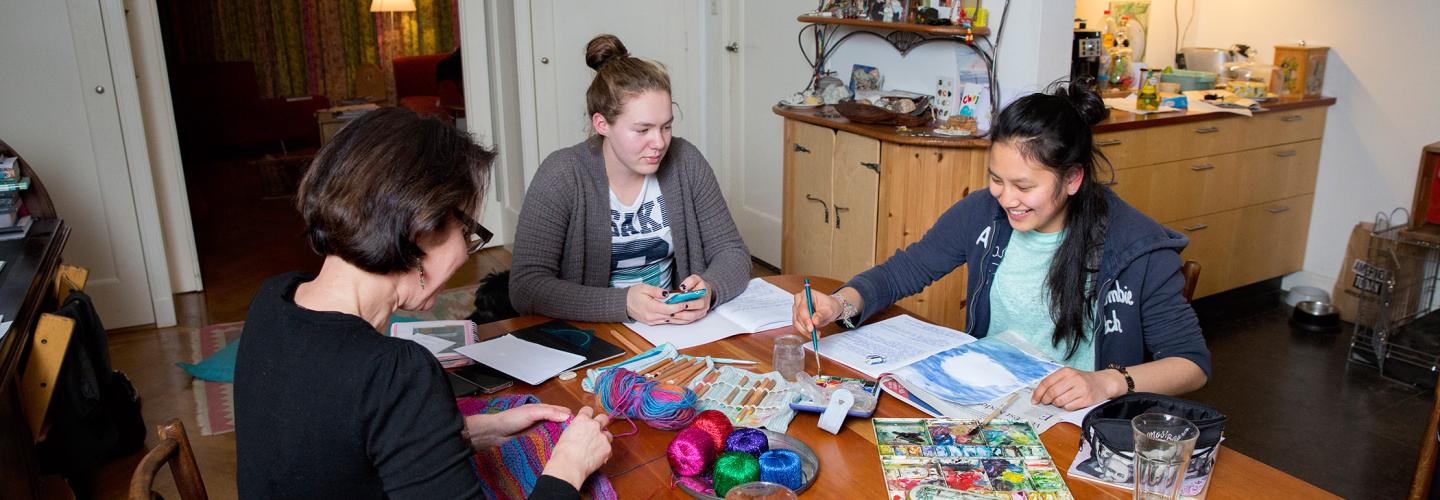Would you like to come to the Netherlands a an au pair? Then you need a residence permit from the IND. Read more about this on the page Residence permit au pair.
The IND receives residence applications from au pairs via au pair agencies. They are so-called recognised sponsors: organisations, companies, or institutions that act as an intermediary for a foreign national’s arrival. Subsequently, the IND checks whether the au pair is really entitled to a residence permit for up to 1 year.
If the au pair (someone from outside the EU) needs a provisional residence permit (in Dutch: machtiging tot voorlopig verblijf or MVV) to come to the Netherlands, the au pair agency applies for an MVV for entry and residence (in Dutch: Toegang en Verblijf or TEV). This is not necessary for countries without an MVV requirement or if the au pair already has a residence document from a Schengen country. Then it is enough to apply for a regular residence permit.
Cultural exchange
The purpose of residence as an au pair in the Netherlands is to learn more about Dutch society and culture. Currently, the au pair must be aged between 18 and 25, live with a host family and participate in family life. In this way, the au pair and host family can learn about their respective cultures.
An au pair´s tasks
The host family must provide the au pair with board and lodging. The au pair must also receive an allowance to explore the Netherlands. In return for this, the au pair must carry out up to 30 hours of light household duties per week and help to take care of the children. Other requirements an au pair must meet are provided on our website here.
Figures au pairs per year
Number of residence permits
| | 2018 | 2019 | 2020 | 2021 | 2022 | 2023 | 2024 |
| Total | 1,400 | 1,470 | 1,200 | 1,380 | 1,630 | 1,980 | 2,310 |
Top 5 nationalities
| | 2018 | 2019 | 2020 | 2021 | 2022 | 2023 | 2024 |
| Filipino | 440 | 470 | 440 | 500 | 580 | 710 | 840 |
| South-African | 360 | 360 | 310 | 340 | 390 | 470 | 520 |
| Brazilian | 180 | 160 | 110 | 110 | 150 | 130 | 120 |
Signals of abuse
In recent years, several dozens of cases of abuse of the au pair scheme were reported. Many au pairs were said to work more than 30 hours a week and had to carry out heavy household duties. Moreover, au pairs are often in a dependent situation or come to the Netherlands to earn money for their family in their home country. For this reason, au pairs would be reluctant to report abuse of the residency scheme.
Au pair agencies are not authorised to monitor compliance with the rules in host families. The police and Dutch Labour Inspectorate are allowed to carry out inspections in case of suspected abuse.But for this, authorisation is needed from the public prosecutor to enter a house. Just like au pair agencies, the IND is not authorised to carry out inspections, but we can revoke an au pair’s residence permit. This can also prevent au pairs from reporting breach of the rules.
New rules
To protect the cultural nature of the au pair scheme, former Minister Broekers-Knol announced new rules in November 2021. They must limit financial dependence on the au pair scheme and counter abuse. First, an au pair will soon no longer be allowed to be married and have children or foster children. Au pairs must submit a single status declaration and their own statement of non-parenthood. The au pair agency will be responsible for assessing these statements. The IND will make extra efforts to inform au pair agencies about this.
Second, persons aged 25 and over will no longer be allowed to use the au pair scheme in the future. Older au pairs are relatively more likely to have children or partners who depend on their income. This makes abuse of the au pair scheme more likely. In the period of 2011 to 2020, around a quarter of au pair applications were from persons older than 25.


